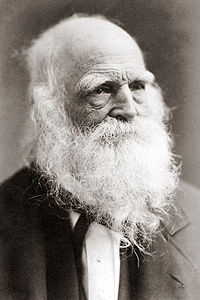Thanatopsis
William Cullen Bryant 1794 (Cummington) – 1878 (New York City)
To him who in the love of nature holds
Communion with her visible forms, she speaks
A various language; for his gayer hours
She has a voice of gladness, and a smile
And eloquence of beauty; and she glides
Into his darker musings, with a mild
And healing sympathy that steals away
Their sharpness ere he is aware. When thoughts
Of the last bitter hour come like a blight
Over thy spirit, and sad images
Of the stern agony, and shroud, and pall,
And breathless darkness, and the narrow house,
Make thee to shudder, and grow sick at heart;--
Go forth, under the open sky, and list
To Nature's teachings, while from all around--
Earth and her waters, and the depths of air--
Comes a still voice. Yet a few days, and thee
The all-beholding sun shall see no more
In all his course; nor yet in the cold ground,
Where thy pale form was laid, with many tears,
Nor in the embrace of ocean, shall exist
Thy image. Earth, that nourished thee, shall claim
Thy growth, to be resolved to earth again,
And, lost each human trace, surrendering up
Thine individual being, shalt thou go
To mix forever with the elements,
To be a brother to the insensible rock
And to the sluggish clod, which the rude swain
Turns with his share, and treads upon. The oak
Shall send his roots abroad, and pierce thy mold.
Yet not to thine eternal resting-place
Shalt thou retire alone, nor couldst thou wish
Couch more magnificent. Thou shalt lie down
With patriarchs of the infant world -- with kings,
The powerful of the earth -- the wise, the good,
Fair forms, and hoary seers of ages past,
All in one mighty sepulchre. The hills
Rock-ribbed and ancient as the sun, -- the vales
Stretching in pensive quietness between;
The venerable woods -- rivers that move
In majesty, and the complaining brooks
That make the meadows green; and, poured round all,
Old Ocean's gray and melancholy waste,--
Are but the solemn decorations all
Of the great tomb of man. The golden sun,
The planets, all the infinite host of heaven,
Are shining on the sad abodes of death
Through the still lapse of ages. All that tread
The globe are but a handful to the tribes
That slumber in its bosom. -- Take the wings
Of morning, pierce the Barcan wilderness,
Or lose thyself in the continuous woods
Where rolls the Oregon, and hears no sound,
Save his own dashings -- yet the dead are there:
And millions in those solitudes, since first
The flight of years began, have laid them down
In their last sleep -- the dead reign there alone.
So shalt thou rest -- and what if thou withdraw
In silence from the living, and no friend
Take note of thy departure? All that breathe
Will share thy destiny. The gay will laugh
When thou art gone, the solemn brood of care
Plod on, and each one as before will chase
His favorite phantom; yet all these shall leave
Their mirth and their employments, and shall come
And make their bed with thee. As the long train
Of ages glides away, the sons of men--
The youth in life's fresh spring, and he who goes
In the full strength of years, matron and maid,
The speechless babe, and the gray-headed man--
Shall one by one be gathered to thy side,
By those, who in their turn, shall follow them.
So live, that when thy summons comes to join
The innumerable caravan, which moves
To that mysterious realm, where each shall take
His chamber in the silent halls of death,
Thou go not, like the quarry-slave at night,
Scourged to his dungeon, but, sustained and soothed
By an unfaltering trust, approach thy grave
Like one who wraps the drapery of his couch
About him, and lies down to pleasant dreams.
Font size:
Submitted on May 13, 2011
Modified on March 24, 2023
- 3:16 min read
- 202 Views
Quick analysis:
| Scheme | XXXXXXXXAXBXXCDEXXDXCXFXXXXFXX GXDHXXXXXXXBXBIIJXXHXXDEXDX XXXXEGXKFFXXXXK XXXJAXXXX |
|---|---|
| Closest metre | Iambic pentameter |
| Characters | 3,492 |
| Words | 653 |
| Stanzas | 4 |
| Stanza Lengths | 30, 27, 15, 9 |
Translation
Find a translation for this poem in other languages:
Select another language:
- - Select -
- 简体中文 (Chinese - Simplified)
- 繁體中文 (Chinese - Traditional)
- Español (Spanish)
- Esperanto (Esperanto)
- 日本語 (Japanese)
- Português (Portuguese)
- Deutsch (German)
- العربية (Arabic)
- Français (French)
- Русский (Russian)
- ಕನ್ನಡ (Kannada)
- 한국어 (Korean)
- עברית (Hebrew)
- Gaeilge (Irish)
- Українська (Ukrainian)
- اردو (Urdu)
- Magyar (Hungarian)
- मानक हिन्दी (Hindi)
- Indonesia (Indonesian)
- Italiano (Italian)
- தமிழ் (Tamil)
- Türkçe (Turkish)
- తెలుగు (Telugu)
- ภาษาไทย (Thai)
- Tiếng Việt (Vietnamese)
- Čeština (Czech)
- Polski (Polish)
- Bahasa Indonesia (Indonesian)
- Românește (Romanian)
- Nederlands (Dutch)
- Ελληνικά (Greek)
- Latinum (Latin)
- Svenska (Swedish)
- Dansk (Danish)
- Suomi (Finnish)
- فارسی (Persian)
- ייִדיש (Yiddish)
- հայերեն (Armenian)
- Norsk (Norwegian)
- English (English)
Citation
Use the citation below to add this poem to your bibliography:
Style:MLAChicagoAPA
"Thanatopsis" Poetry.com. STANDS4 LLC, 2024. Web. 31 Oct. 2024. <https://www.poetry.com/poem/40324/thanatopsis>.



Discuss the poem Thanatopsis with the community...
Report Comment
We're doing our best to make sure our content is useful, accurate and safe.
If by any chance you spot an inappropriate comment while navigating through our website please use this form to let us know, and we'll take care of it shortly.
Attachment
You need to be logged in to favorite.
Log In